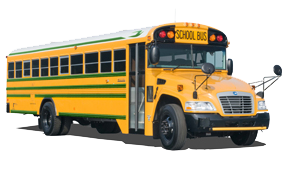Tuesday, February 21, 2017
The first of 26 propane-powered school buses were unveiled at a February 2016 ceremony in Summerville, S.C. In an effort to be more economically and environmentally responsible, South Carolina purchased the Blue Bird Vision school buses to replace aging diesel buses. The alternative-fuel buses will be deployed to Dorchester and Berkeley counties. 
“While the South Carolina Department of Education is in a low-bid state, we had heard about the propane technology that Blue Bird propane buses possess from various sources,” said Mike Bullman, director of maintenance. “With aging diesel buses in our fleet, it was time to replace them and propane was the option we thought worked best financially and environmentally speaking over the long term.”
The propane buses represent the largest order of alternative-fuel school buses that the state has placed into service in the last 30 years. The buses were purchased from Blue Bird Corp.’s newest dealership in North America, Blanchard Bus Centers.
“We are pleased to offer alternative-fuel options for school buses,” said Joe Blanchard, president. “We believe the state of South Carolina will begin to see immediate benefits from these new clean buses. The financial savings should be noticeable from the beginning. An average propane bus saves a school district up to $3500 a year in fuel costs alone.”
Blue Bird Vision propane buses emit 80% less smog-producing hydrocarbons and virtually eliminate particulate matter when compared with conventional diesel. The buses will reduce nitrogen oxide (NOx) emissions by more than 40,600 pounds and particulate matter by more than 825 pounds each year compared with the diesel buses being replaced. Equipped with Ford Motor Co.’s 8.6-liter V-10 engine, each bus includes a Roush CleanTech propane fuel system.
“Propane autogas is a proven alternative fuel option for school districts,” said Todd Mouw, vice president of sales and marketing at Roush CleanTech. “This domestic fuel also produces far less particulate matter and NOx emissions than diesel, so the buses don’t require expensive and difficult-to-maintain after-treatment components to make them run clean.”
“Sales of the Vision propane bus increased 33% in 2016 when compared to 2015, and it’s no surprise to us,” added Mark Terry, Blue Bird Corp. COO. “These buses clearly work to save districts money, and are incredibly environmentally friendly. We are glad to see that South Carolina has added this amazing product to its fleet. We know they will not be disappointed.”

“While the South Carolina Department of Education is in a low-bid state, we had heard about the propane technology that Blue Bird propane buses possess from various sources,” said Mike Bullman, director of maintenance. “With aging diesel buses in our fleet, it was time to replace them and propane was the option we thought worked best financially and environmentally speaking over the long term.”
The propane buses represent the largest order of alternative-fuel school buses that the state has placed into service in the last 30 years. The buses were purchased from Blue Bird Corp.’s newest dealership in North America, Blanchard Bus Centers.
“We are pleased to offer alternative-fuel options for school buses,” said Joe Blanchard, president. “We believe the state of South Carolina will begin to see immediate benefits from these new clean buses. The financial savings should be noticeable from the beginning. An average propane bus saves a school district up to $3500 a year in fuel costs alone.”
Blue Bird Vision propane buses emit 80% less smog-producing hydrocarbons and virtually eliminate particulate matter when compared with conventional diesel. The buses will reduce nitrogen oxide (NOx) emissions by more than 40,600 pounds and particulate matter by more than 825 pounds each year compared with the diesel buses being replaced. Equipped with Ford Motor Co.’s 8.6-liter V-10 engine, each bus includes a Roush CleanTech propane fuel system.
“Propane autogas is a proven alternative fuel option for school districts,” said Todd Mouw, vice president of sales and marketing at Roush CleanTech. “This domestic fuel also produces far less particulate matter and NOx emissions than diesel, so the buses don’t require expensive and difficult-to-maintain after-treatment components to make them run clean.”
“Sales of the Vision propane bus increased 33% in 2016 when compared to 2015, and it’s no surprise to us,” added Mark Terry, Blue Bird Corp. COO. “These buses clearly work to save districts money, and are incredibly environmentally friendly. We are glad to see that South Carolina has added this amazing product to its fleet. We know they will not be disappointed.”

